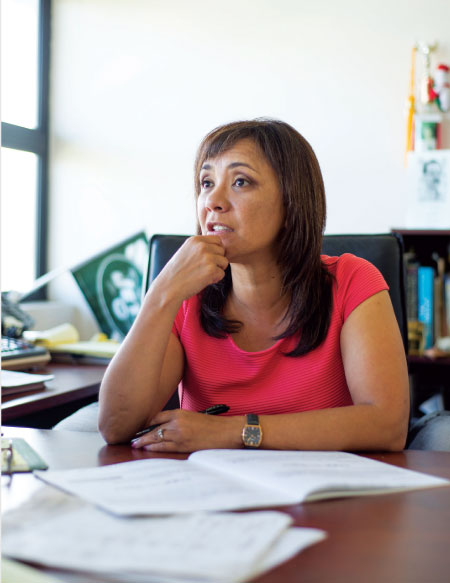GIVING HOPE AND ALTERNATIVES TO KIDS
The philosophy of Adult Friends for Youth is that even the toughest kids can change. Just make sure you’re there to help when they choose to change.
Deborah Spencer-Chun has the deep-seated belief that “Kids can change no matter what level of trouble they get into.”
That’s the philosophy that drives her and her nonprofit organization, Adult Friends for Youth. “We believe that given the opportunity, they will make changes in their lives,” she says.
“We’re not a short-term program, we’re long-term. The length of time we work with any group averages three to four years. And sometimes it’s longer, four to six years. It depends on where they are and what help they need.”
AFY and its small group of social workers operate out of a labyrinth of offices in a building flanked by the H1 Airport Viaduct. They also work in some of Oahu’s toughest neighborhoods, like the Kalihi housing projects of Kuhio Park Terrace and along Kamehameha IV Road.
We don’t believe in changing just one life, but in changing a group. Then you can change many lives.”
“We don’t believe that these kids are throwaways,” says Spencer-Chun, AFY’s chief executive officer. “There’s a point when people fear that someone is a lost cause and too old to change, so the focus is often on the elementary children. The perception is always to get them early so they don’t get into trouble, but we believe we need to focus at all levels. But kids are starting (in gangs) at younger levels today. When we pick up a group, we see kids as young as fourth grade, all the way to adults. I would be sad if we gave up on the high-school level because you would be giving up on the next generation.
“A lot of them come so damaged. There’s not a sense of love. They’re labeled so badly by society that by the time they come to us, they don’t believe anybody cares anymore. You have to put in that extra effort, and we’re the first ones to show you that you matter. Many of our kids test us all the time. So if we say we’re going to be there and give you our number, we mean it. They’ll call you and see how true you are to your word. That was the same for Mo. He would call at 2 in the morning, 3 in the morning, saying, ‘I just got in a fight and I need a ride.’ I would come out and he’d say, ‘Gee, you’re for real.’ ”
Today, Mo Maumalanga works for AFY.

“We don’t decide for them,” Spencer-Chun continues. “They really have to make the decision. We put it in their court and sometime they make bad choices. ‘OK, you got into a fight and got arrested, now what do you want to do and how can I support you through that process?’
“We challenge them and hold our kids accountable. (We tell them) ‘If you keep going along these lines, this is what your future is going to be.’ It’s so sad when they feel there is no future. They’ll say, ‘I’ll be in prison. I’ll be dead.’ You have to provide hope that it doesn’t need to be that way. Let’s look at the alternatives.
“It can be as simple as taking them into new communities. One of the things that statistics show is that most low-income kids do not actually go beyond a five-mile radius of their home. They’re very territorial. They’re very limited. They stay within their own community. So we’ll take them in a van and hold a meeting at UH or at the baseball field. We’ll hold it anywhere just for them to see that they’re no different from the people who go to school there. They might see kids – ‘Hey, I saw them at Farrington.’
“I guess one of the unique things abut AFY is we work with groups as whole entities. And we have them hold each other accountable. The whole focus is on group therapy. If the group says they want to change and the members are still going out and fighting, we bring it back to the table. ‘How do you guys reach a goal?’ There’s a caring and nurturing person that helps them and then the group is holding itself accountable for what they want.
“A lot of times you see this after a couple of years, a guy says enough is enough, I have to graduate. Or I have a family now. Or I’m on probation and have a job. Or you guys are messing me up. You actually hear these conversations. We are there to make sure it’s a positive experience when they’re having these conversations. We’re there to facilitate the conversation when it happens and provide a respectful place to have that conversation. And they begin to use their words instead of their hands. It’s attitude-changing, belief-system changing.
“People all say if you can change one life, you can make an impact. We don’t believe in changing just one life, but in changing a group. Then you can change many lives.”